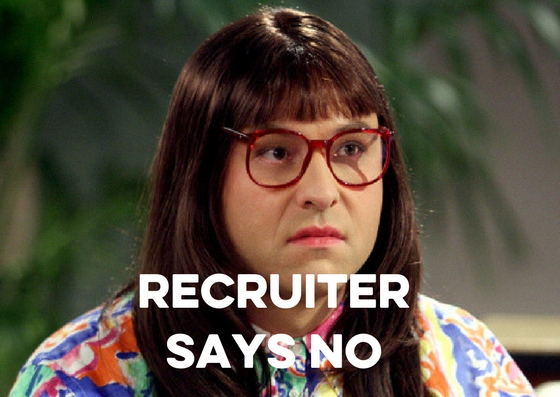
Recruiter Says No
‘A rejection is nothing more than a necessary step in the pursuit of success.’ – Bo Bennett
I was having dinner with a friend of mine recently and I started talking about how we reject a vast majority of people in our job in recruitment on a daily basis.
At some point in the process, every single candidate, bar one, will be rejected.
As recruiters, it’s our job to handle that process in a professional, respectful and appropriate manner which often depends on the level of engagement you have with the candidate.
Admittedly this rejection gets easier to deliver with time. There are certain ways you can give the news that makes people feel better about themselves. But ultimately, this means the end of the road for them in that particular process.
My friend works in the medical profession and began to recount the news they sometimes have to deliver to their patients which literally means the end of the road to them. That really humbled me and it helped me put into perspective what we do in the recruitment industry.
What we do can ultimately change a person’s life – they can get a better job, more money, more job satisfaction and move cities – which can sometimes dictate where they live and where their children may go to school.
But it’s not life and death stuff.
That’s why it’s important to remember that there are so many reasons for that rejection from a recruiter to come your way and I think you should treat it as a learning process instead of beating yourself up about it.

SO I THOUGHT I WOULD SHARE MY REASONS ABOUT WHY THAT RECRUITER GAVE YOU THE BIG N.O. AND WHY IT’S NOT NECESSARILY A BAD THING:
REASON 1: CULTURE FIT
We all spend a big part of our day at work and this means a big part of our lives are spent with the people we work with. When interviewing for a particular job, the interviewer isn’t just assessing your skills and responses to technical questions but also how you would fit in with their current team.
Just because you won’t fit in, isn’t a bad reflection on you. It just means that there is probably a company culture more suited to your personality. You want to work with like-minded people right?
At its core, cultural fit means that employees’ beliefs and behaviours are in alignment with their employer’s core values and company culture.
That hiring manager doesn’t want to hire you and then you don’t get along with the majority of the team.
Employees who fail to fit within the environment generally leave to find a work environment or culture which is more congruent with their own values and beliefs.
REASON 2: EXPERIENCE
Experience encompasses a range of factors. You might not have enough experience for that job, or you might have way too much. An employer doesn’t want to place you in a role that you could do in your sleep and have you leaving in 3 months. That would mean they would have to start the recruitment process all over again.
Industry experience also comes into play here. You might ask then how do I change industries? It’s hard being pigeon holed but put yourself in the hiring manager’s shoes. If two candidates show up, both with great backgrounds but one has industry experience, automatically they will lean towards that person.
If you are looking to change industries to broaden your career experience, don’t keep mum on your interview. Explain to the hiring manager or interviewer how you would apply your transferable skills to your new role. Ask yourself these questions: Does this industry have similar deadlines? The same system? Similar revenue and funding streams? If so talk about this in the interview!
REASON 3: MOTIVATION AND AVAILABILITY
This can sometimes be a make or break for the hiring manager. If you’re applying for a permanent job role, you might be the number 1 when it comes down to it but unfortunately, you have a 2-month round-the-world trip you just cannot give up right on their year end and that just won’t work for them.
Another big factor is your availability. For permanent jobs, this is probably not such a big problem but if you’re a professional contractor you might be passed up because they need someone to start asap and you have to give 4 weeks notice. This is of course not a reflection on you but rather a logistical problem.
It’s hard when you get a no from your recruiter or potential employer. The best you can do with the no is to ask for feedback about why learn from it and move on to your next challenge.

